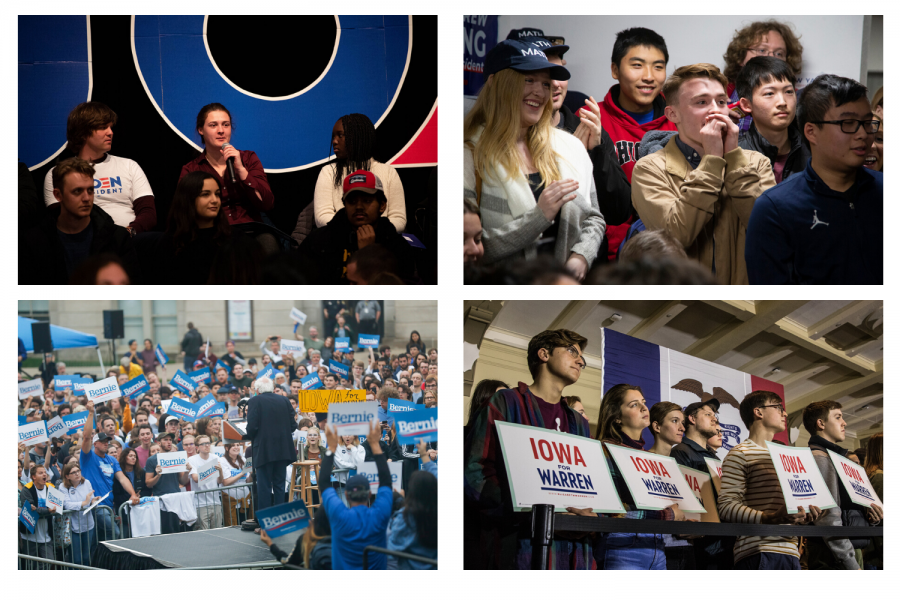Despite tight budgets, UI students chip in to support 2020 bids
Some students say they donate to presidential campaigns when it fits into their budget, while others say donating time can be more valuable.
When U.S. House Speaker Nancy Pelosi announced the beginning of an impeachment inquiry against President Trump, first-year University of Iowa student Jack Bryson felt it was a critical moment for Trump’s campaign.
Bryson, president of Hawks for Trump, decided to donate $5 to Trump for the first time. He said he felt the donation was especially important in a moment when Trump’s actions as president were called into question.
“I’m not really the type to donate when success is at an all-time high,” Bryson said. “I donate during moments of desperation, when the campaign needs citizens that support it to rally around [it]. “I felt like that was a pretty uncertain moment, so I decided to chip in and help out.”
While the constraints of a student budget can make finding the cash to donate to candidates tough, some UI students are giving to the candidates they support in the 2020 presidential election.
Donations to federal campaigns are only required to be disclosed if an individual donates more than $200 to a campaign, although some contributions under $200, made through providers Actblue and Winred, are also counted.
Federal Election Commission data disclosing donations to presidential candidates from people who identified from students totals $882,736 nationwide since January 2019.
In Iowa, disclosed donations from students totaled $7,590.
According to PolitiFact, the total number of Americans who contribute any amount to a campaign can only be determined if you literally ask someone whether they have donated, which is usually done through polling.
According to data from the Pew Research Center, 12 percent of Americans gave to candidates in 2016. A more recent CNBC/Surveymonkey poll from June 2019 showed that 8 percent of respondents had donated to a 2020 presidential-nomination candidate, while 19 percent said that they planned to.
Fourth-year student Cam Newton has donated to entrepreneur Andrew Yang’s campaign, contributing around three separate contributions of $20 each time. Newton said Yang is the first candidate’s campaign he has donated to.
“I’ve always wanted to be active in the political process, but it wasn’t until Andrew Yang that I found someone that I felt like they were worth donating money to,” Newton said. “To support someone who’s always been low in the polls and kind of a relative unknown, it feels like it makes a bigger difference.”
Newton said that while most college students struggle to save money, the money he donated to the Yang campaign is well-spent.
“I probably could be using my money to buy groceries or something like that, but I felt that it was important enough for me to donate,” Newton said. “To see Yang rising in the polls, that makes me feel confident in spending that money.”
For other students, the constraints of a student budget can make donating to candidates difficult, so they choose to get politically involved in other ways.
Fourth-year student Jordan Miller said he donated to Democratic presidential candidates in 2016, but as a college student, has not been able to donate to candidates in the current 2020 presidential race.
Miller said he spends 10-15 hours a week volunteering for former Vice President Joe Biden’s presidential bid in addition to being involved in other student organizations and working for Cambus.
“I have not donated this time around, just because money’s tighter now as a college student,” said Miller, president of UI Students for Biden. “If I’m able to donate time … I’d rather do that. I feel like it makes more of a lasting impact.”
University Democrats Vice President Megan McEvoy said she does not personally know of students who are able to make substantial donations to campaigns, though some will donate $1 or so in response to texts from campaigns.
“I’m getting involved as an activist because I can’t donate because I don’t have money,” McEvoy said. “But I do volunteer for different campaigns — and with UDems we try to have every candidate come and speak, so just getting candidates on campus is a big issue.”



